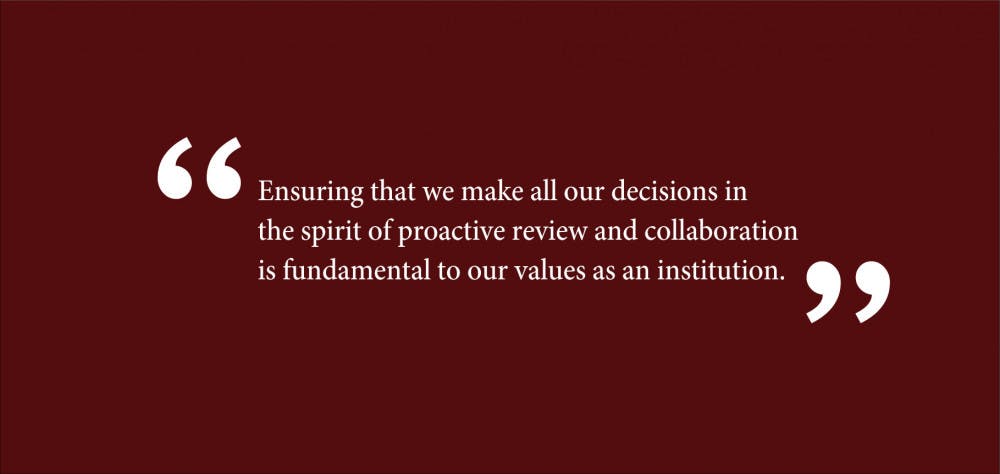Last year, the Brown student body voted overwhelmingly to increase transparency around the practice of legacy admission — a vote organized by the #FullDisclosure campaign. In response, the University formed a committee to increase low-income student representation on campus, as reported by The Herald. There is a sincere commitment on all sides to having equity and diversity be the tenets of our admission policies, as demonstrated by this new committee and other University initiatives (not least the much-touted Brown Promise). These efforts should be applauded. But something in The Herald article about the new committee irked me. In the story, Dean of Admission Logan Powell is paraphrased as saying that “legacy admission is an institutional priority that the Admission Office does not control.” In other words, the committee formed in response to student calls to review the practice of legacy admission has no power to actually address this issue — not because Dean Powell intentionally obstructs student efforts, but because the Admission Office itself cannot consider the issue. Despite clear support for transparency regarding legacy admission, the one body that purportedly addresses the subject ultimately proves impotent.
Dean Powell’s statement immediately begs the question: Who does decide that legacy admission continues to be an institutional priority? My first impulse was to think of the College Curriculum Council, on which I serve as an undergraduate representative. Indeed, our charge as described in the Faculty Rules and Regulations includes hearing “reports annually from the Dean of Admission.” However, we do not deal with admission policy as such (and I don’t think this should change; the CCC has a well-defined and reasoned remit). Perhaps, then, the regular review of higher-level admission policy is vested in the Academic Priorities Committee or the Corporation through its Committee on Academic Affairs. This does not appear to be true, as far as we know. Instead, institutional priorities can be set through shared governance — in other words, ad hoc conversations between different members of the Brown community. This is a sensible model insofar as it pertains to initiatives. Actions we take as an institution can and should arise with the input of all our community’s stakeholders. I would be the last to recommend that initiatives should only percolate through the bureaucracy of committees.
But longstanding policies like prioritizing children of Brown alums in admission are a different matter. Indeed, reviewing our policies is the reason statutory committees play an important role in our governance structure. My service on the CCC has demonstrated that regular review of academic programs is essential to ensuring that they continue to serve our institutional priorities and achieve our academic objectives. We don’t wait for problems to arise in the open curriculum; instead, we review all aspects of the curriculum proactively. Such regular review ensures that a concentration isn’t expected to founder before we take action to bring its academic standards in line with the rest of the University. Instead, we can evaluate — as often as possible — whether the things we do achieve our goals. There is a widespread consensus that this model of governance is what ensures consistent, continued excellence. This paradigm is also suffused with a spirit of collaboration that is in some ways unique to Brown. Our exceptional commitment to listening to each other and engaging in a hospitable, empathetic and generous mode ensures that our policy-building process incorporates accountability of faculty members, guidance from administrators and input from students while reflecting the values of the broader University community.
The practice of legacy admission at Brown should be subject to these same standards. It is true that we must set institutional priorities. Should we invest in new dormitories and expand the size of incoming classes (as Yale has done)? In my opinion, no. Should we make admissions need-blind for all students? Yes, though we’re not there yet (see the recurring calls for making international admission need-blind). Should we instruct our admissions officers to ignore whether or not a student’s parents went to Brown? I’m not sure. But I do know that this is a question that should be discussed in the open, on a regular, proactive basis, in a manner that involves members of the entire Brown community — faculty, administrators and students, at the very least. As it is right now, the policy of legacy admission seems to fall through a gap: it is not reviewed by any statutory committee, nor is it something the Admission Office controls. This can happen even if everyone is equally committed to equity and diversity as joint tenets of admission practices. What we have here is not someone failing to do their job (or anything malevolent) but instead an institution that does not clearly make reviewing practices like legacy admission anyone’s job. Ensuring that we make all our decisions in the spirit of proactive review and collaboration is fundamental to our values as an institution. It is incumbent on us to ensure that legacy admission is also reviewed in this manner. I am not asking that legacy admission stop being an institutional priority, but we should have a clear mechanism for deciding whether or not it should be so.
Aliosha Bielenberg ’20 serves as an undergraduate student representative on the College Curriculum Council and can be reached at aliosha_bielenberg@brown.edu. He is happy to talk faculty governance with anyone and everyone interested. Please send responses to this opinion to letters@browndailyherald.com and op-eds to opinions@browndailyherald.com.




